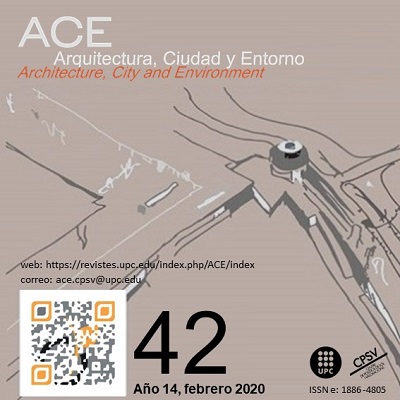Unsustainability of social housing settlements in México: an approach from design thinking. Case study: Tlajomulco de Zúñiga, Jalisco
DOI:
https://doi.org/10.5821/ace.14.42.8256Keywords:
Project management cycle, urban-environmental deterioration, complexity, urban planningAbstract
The main objective of this work is to identify the drivers of deterioration of social housing settlements in México within the city-environment relationship. The methodology is divided into two sections: theoretical foundation and empirical data analysis. First part consists in analyzing the housing production management cycle based on its policies and administrative procedures and second part is an empirical approach to the problematic through design thinking considering the following stages: 1) Empathy with the user, 2) Problem definition, 3) Solution abstraction, 4) Conceptualization of a model and, 5) Performance assessment. Environmental deterioration of urban context of social housing in mexican cities is a result of: on one hand, decrease of State intervention over legislation and policies that regulate land speculation and social housing production and, on the other hand, the dilution over the responsibility of built environment between the municipality, developers, contractors and a weak regulation on welfare issues about the quality of social housing and its environment. This paper is a case study wich addresses the complexity of social housing production. It represents a methodological proposal to study the urban-environmental unsustainability of social housing settlements over multidisciplinary epistemological bases, such as: design thinking and project management.
Downloads
Published
Issue
Section
License
| INTELECTUAL PROTECTION CRITERIA |
At this moment, it is count with the "Oficina Española de Patentes y Marcas", while global protection it is being processed by the World Intelectual Property Organization (OMPI/WIPO). Nevertheless the International Standard Serial Number Office (ISSN) has given the following numbers ISSN: 1886-4805 (electronic version) and 1887-7052 (paper version). All articles will be peer reviewed, using double blind reviewing. |
| COPYRIGHT |
The article contents and their comments are authors exclusive liability, and do not reflect necessarily the journal editor commitee's opinion. All ACE published works are subject to the following licence CC BY-NC-ND 3.0 ES http://creativecommons.org/licenses/by-nc-nd/3.0/es/ It implies that authors do not hold nor retain the copyright without restrictions but only those included in the licence. |





































